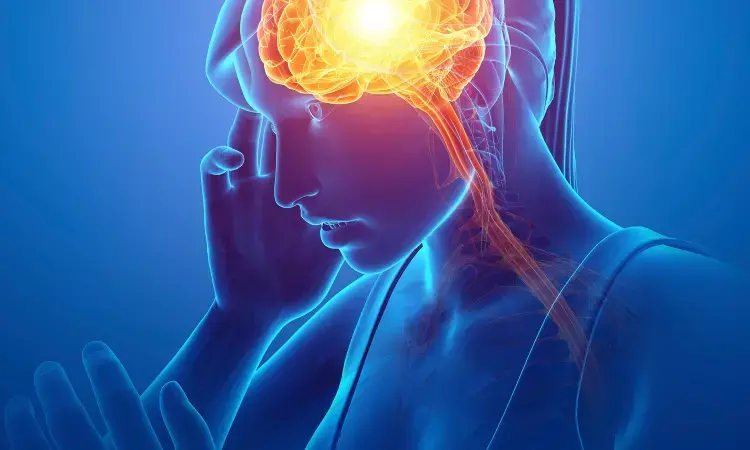- Home
- Medical news & Guidelines
- Anesthesiology
- Cardiology and CTVS
- Critical Care
- Dentistry
- Dermatology
- Diabetes and Endocrinology
- ENT
- Gastroenterology
- Medicine
- Nephrology
- Neurology
- Obstretics-Gynaecology
- Oncology
- Ophthalmology
- Orthopaedics
- Pediatrics-Neonatology
- Psychiatry
- Pulmonology
- Radiology
- Surgery
- Urology
- Laboratory Medicine
- Diet
- Nursing
- Paramedical
- Physiotherapy
- Health news
- Fact Check
- Bone Health Fact Check
- Brain Health Fact Check
- Cancer Related Fact Check
- Child Care Fact Check
- Dental and oral health fact check
- Diabetes and metabolic health fact check
- Diet and Nutrition Fact Check
- Eye and ENT Care Fact Check
- Fitness fact check
- Gut health fact check
- Heart health fact check
- Kidney health fact check
- Medical education fact check
- Men's health fact check
- Respiratory fact check
- Skin and hair care fact check
- Vaccine and Immunization fact check
- Women's health fact check
- AYUSH
- State News
- Andaman and Nicobar Islands
- Andhra Pradesh
- Arunachal Pradesh
- Assam
- Bihar
- Chandigarh
- Chattisgarh
- Dadra and Nagar Haveli
- Daman and Diu
- Delhi
- Goa
- Gujarat
- Haryana
- Himachal Pradesh
- Jammu & Kashmir
- Jharkhand
- Karnataka
- Kerala
- Ladakh
- Lakshadweep
- Madhya Pradesh
- Maharashtra
- Manipur
- Meghalaya
- Mizoram
- Nagaland
- Odisha
- Puducherry
- Punjab
- Rajasthan
- Sikkim
- Tamil Nadu
- Telangana
- Tripura
- Uttar Pradesh
- Uttrakhand
- West Bengal
- Medical Education
- Industry
Higher antioxidant levels linked to lower dementia risk

MINNEAPOLIS: People with higher levels of antioxidants in their blood may be less likely to develop dementia, according to a study published in the May 4, 2022, online issue of Neurology, the medical journal of the American Academy of Neurology.
The study found that people with the highest levels of the antioxidants lutein and zeaxanthin and beta-cryptoxanthin in their blood were less likely to develop dementia decades later than people with lower levels of the antioxidants. Lutein and zeaxanthin are found in green, leafy vegetables such as kale, spinach, broccoli and peas. Beta-cryptoxanthin is found in fruits such as oranges, papaya, tangerines and persimmons.
"Extending people's cognitive functioning is an important public health challenge," said study author May A. Beydoun, PhD, MPH, of the National Institutes of Health's National Institute on Aging in Baltimore, Maryland. "Antioxidants may help protect the brain from oxidative stress, which can cause cell damage. Further studies are needed to test whether adding these antioxidants can help protect the brain from dementia."
The study involved 7,283 people who were at least 45 years old at the beginning of the study. They had a physical exam, interview and blood tests for antioxidant levels at the beginning of the study. They were then followed for an average of 16 years to see who developed dementia.
The participants were divided into three groups based on their levels of antioxidants in the blood. People with the highest amounts of lutein and zeaxanthin were less likely to develop dementia than those with lower levels. Every standard deviation increase in lutein and zeaxanthin levels, approximately 15.4 micromols/liter, was associated with a 7% decrease in risk of dementia. For beta-cryptoxanthin, every standard deviation increase in levels, approximately 8.6 micromols/liter, was associated with a 14% reduced risk of dementia.
"It's important to note that the effect of these antioxidants on the risk of dementia was reduced somewhat when we took into account other factors such as education, income and physical activity, so it's possible that those factors may help explain the relationship between antioxidant levels and dementia," Beydoun said.
A limitation of the study is that antioxidant levels were based on one measurement of blood levels and may not reflect people's levels over their lifetime.
The study was supported by the National Institute on Aging, part of the National Institutes of Health.
Dr Kamal Kant Kohli-MBBS, DTCD- a chest specialist with more than 30 years of practice and a flair for writing clinical articles, Dr Kamal Kant Kohli joined Medical Dialogues as a Chief Editor of Medical News. Besides writing articles, as an editor, he proofreads and verifies all the medical content published on Medical Dialogues including those coming from journals, studies,medical conferences,guidelines etc. Email: drkohli@medicaldialogues.in. Contact no. 011-43720751


